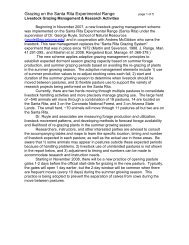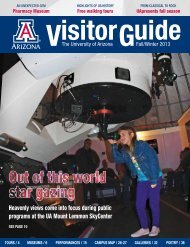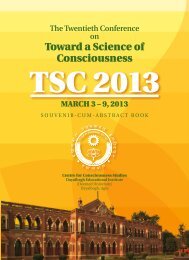CONSCIOUSNESS
Download - Center for Consciousness Studies - University of Arizona
Download - Center for Consciousness Studies - University of Arizona
- No tags were found...
You also want an ePaper? Increase the reach of your titles
YUMPU automatically turns print PDFs into web optimized ePapers that Google loves.
120 3. Cognitive Sciences and Psychology<br />
differed from that prior to on task reports (showing less sensitivity to lexical features). In the<br />
work to be presented we will describe findings which suggest that simple reaction time measures<br />
can also discriminate periods of mindless vs. mindful reading. Here, participants read<br />
a story presented one word at a time, pressing the spacebar to advance the text. Periodically,<br />
participants are probed as to whether they are on task, tuning out, or zoning out. The results<br />
converge with the eye-tracking studies and show that it is possible to predict whether or not a<br />
participant will be mind-wandering at a probe based on the reaction times to the words leading<br />
up to that probe. C19<br />
156 Attentional Orienting - Conscious or Unconscious? Narisa Marrett, Anthony<br />
Lambert. (Psychology, University of Auckland, Auckland,<br />
New Zealand)<br />
Implicit learning is used to describe learning that occurs without intention or conscious<br />
awareness. A series of three experiments are reported here, which all used a bilateral letter<br />
version of Posner’s visual cueing paradigm (Posner, 1980) to explore the contributions of<br />
implicit and explicit (conscious) processes to attentional orienting. In Experiment 1 a valid<br />
letter cue was associated with the target location on 80% of trials and the effects of aging were<br />
examined. In Experiment 2 a ‘split-block’ design was used in which the proportion of valid<br />
trials in the first two blocks was 80%; which was reduced to 50% for the final two blocks.<br />
In Experiment 3 ‘implicit’ and ‘explicit’ letter cues were randomly interspersed, in order to<br />
compare responses to the two trial types. Results indicated that the processes involved in<br />
attentional orienting using bilateral letter cues were largely explicit in nature for both older<br />
and younger adults. This contrasted with earlier findings by Lambert, Naikar, McLachlan and<br />
Aitken (1999; Experiment 1) and reasons for this empirical discrepancy were considered. P9<br />
157 Staying on Track: Mindful Breathing Reduces Mind-Wandering Michael Mrazek,<br />
Jonathan Smallwood; Michael Franklin; Jonathan Schooler <br />
(Psychology, University of California Santa Barbara, Santa Barbara, CA)<br />
This study examined the usefulness of meditation as a tool for leading to short term reductions<br />
in mind-wandering. Participants either completed eight minutes of mindful breathing,<br />
passive resting, or reading before subsequently completing a ten minute sustained attention to<br />
response task commonly used to study mind-wandering. Mindful breathing resulted in significantly<br />
improved performance, indicating that this technique can lead to short term improvements<br />
in attention even among individuals without prior experience with meditation. C10<br />
158 Situation and Self: The Case of the Wandering Mind Jules Troyer<br />
(Psychology, Delta State University, Cleveland, MS)<br />
Traditionally, mind-wandering is viewed as an undesirable decoupling of attention from<br />
a current mental task. When an individual engages in mind-wandering, without awareness, it<br />
greatly impairs the ability to construct effective situational mental models and subsequently<br />
solve problems. Does the propensity for unintentional mind-wandering impair an individual’s<br />
ability to know the self, as well as the external world? This paper investigates whether people<br />
who are less aware of the external environment and the objects and situations occurring within<br />
it, also are less aware of the self and internal thoughts and emotions. The analysis of responses<br />
of 450 participants on the Troyer Level of Consciousness Inventory (Troyer, 2008) and the<br />
Situational Self-Awareness Scale (Govern & Marsch, 2001), strongly indicates that people<br />
who report difficulty in regulating attention have a low awareness of both internal thoughts<br />
and emotions, as well as a low awareness of the external environment. The implications of a<br />
prolonged tendancy of mind-wandering are discussed; including issues such as why people<br />
have a low level of self-awareness, difficulty in regulating their behavior, problems with cognitive<br />
reflection, aversion to openness with others and why certain people do not engage in<br />
empathetic or helping behaviors. C19<br />
3.2 Vision







